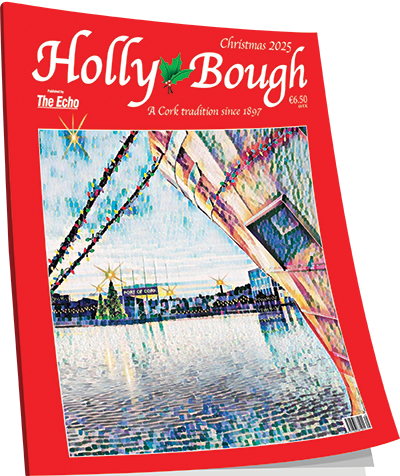Leevale icon Donie Walsh: Train to race, don't get caught up with your time
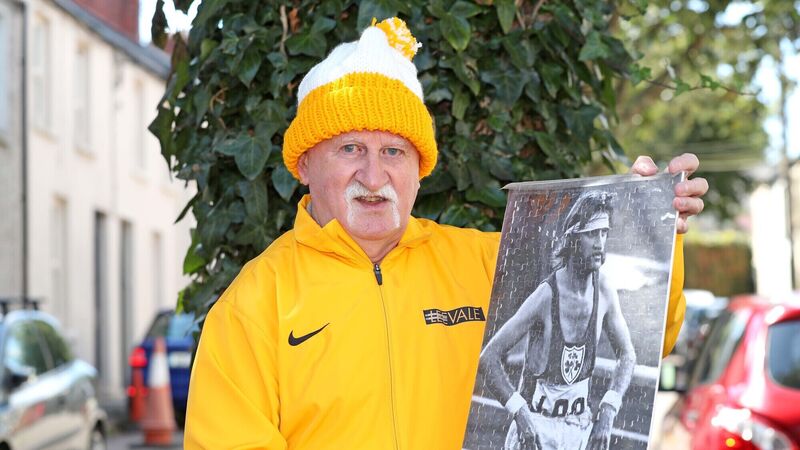
Donie Walsh, Leevale AC, holding an image of himself in jigsaw form, competing in the Marathon at the 1972 Olympics. Picture: Jim Coughlan.
IT was 50 years ago last Sunday, over a snow-clad seven-and-a-half gruelling miles on Dundalk racecourse, that his run of success began.
In his first full season back from Villanova University, Walsh had the Cork county and Munster titles already in the bag but surprisingly wasn’t considered the favourite as he and his club colleagues made the trip north that weekend.
Writing in the in the lead-up to the national decider, athletics correspondent Tim O’Brien explained: “How can one oppose Danny McDaid for the individual gold medal? The Donegal athlete has stormed to the forefront with a number of stunning performances. Victories in the Dublin, Ulster and All-Ireland inter-counties championships have set him up for a grand slam and it will be something of a sensation if he does not carry the day.”
Former champion Fr Paddy Coyle was another fancied, although John Buckley of St Finbarr’s – who took the national title the previous year at Mallow Racecourse – was not in the line-up. “On form it should be McDaid and Coyle but I cannot see Walsh and O’Riordan [Pat, also Leevale] giving in that easily,” wrote Tim O’Brien.
A light fall of snow the previous night soon cleared with the bright sun but it left underfoot conditions white and quite treacherous. A leading group of McDaid, Coyle, English-based Pat Gilsenan and Richard Crowley of St Finbarr’s (runner-up to Walsh in Cork and Munster) soon headed the field. But after two miles Walsh put in a devastating burst and the race was effectively over.
“Walsh wins battle of the giants,” proclaimed the headline on the following morning’s .
To make it an eventual day for Cork, he was followed over the line 19 seconds later by an elated Crowley with Coyle taking third ahead of Gilsenan as a bitterly disappointed McDaid had to settle for fifth.
With Pat O’Riordan seventh, Gene Mealy 19th and Dick Kidney 27th, Leevale took the silver medals, seven points behind Donore who placed their scoring four in the top 16. Fifty years on, Leevale are still trying to win that elusive crown and indeed no Cork club has ever claimed that premier team title.
Other Cork finishers that day in 1973 were: Finny Long (UCC), 14th; Jack O’Callaghan (Leevale) 35th; Denis Manning (St Finbarr’s) 48th; Jerry Murphy (Leevale) 49th; Dick Hodgins (Leevale) 53rd; Joe O’Flynn (UCC) 77th; Jack O’Leary (St Finbarr’s) 79th; Flor O’Leary (St Finbarr’s) 81st.
Walsh would go on be national c-c champion again in 1974, 1975 and 1978. And, looking back a half-century later, the Leevale man admits on a few occasions it wasn’t just on running ability alone that he prevailed.
“There were All-Irelands I should never have won; there were fellows better than me, but you were able to out-fox them on the day,” he now relates.
Currently the respected coach at his beloved Leevale whose colours he wore so proudly (including that famous headband), Walsh imparts the same knowledge that brought himself such success in an era that didn’t have the hi-tech approach and equipment so readily available today.
“You would always run 100 miles a week for five or six weeks and then peak for the day. Every Wednesday was twice a day when I used to do speedwork up in the Tank Field.
“When I was a youth with the NACAI, I think I ran 18 races and never lost a championship in cross-county. I won Cork, Munster and All-Ireland, along with the schools. What’s wrong with people nowadays is that they are so caught up with times.
“You train to race, that’s what I always tell my athletes. And if you beat people that are better than you, you are automatically going to run faster without trying.”
During the 1970s, Donie Walsh of Leevale dominated the Irish cross-country scene. Between 1973 and 1978, four national senior titles came his way, along with a second and third placing.
And to cap it all off, he was a scoring member on the Irish team who captured the silver medals at that never to be forgotten World Championships at Limerick in 1979.

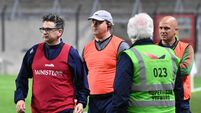
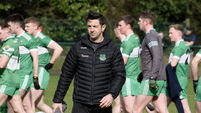
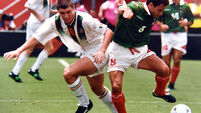
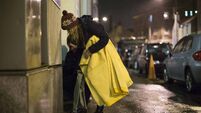

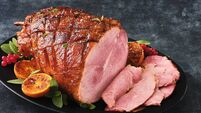
 App?
App?








